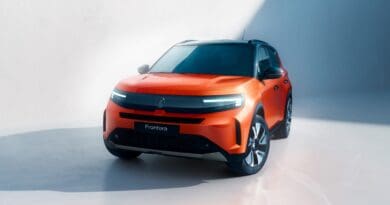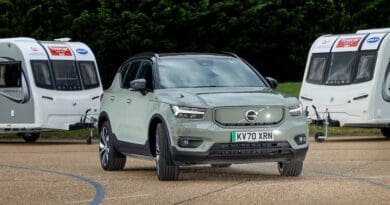
UK government confirms ZEV mandate changes softening hybrid rules
Prime Minister Sir Keir Starmer has announced he is softening the UK’s ZEV mandate to support UK car makers in the face of President Donald Trump’s 25% tariff on UK car exports.
Under major ZEV mandate changes, hybrid vehicles such as the Toyota Prius and Nissan Qashqai will be allowed to remain on sale until 2035, alongside full petrol and diesel vans.
Delivering his first formal response to the tariffs, Starmer said that British industry must accept that “the world has fundamentally changed” and adapt accordingly. He warned that the tariffs, part of Trump’s wider “Liberation Day” trade strategy, were “not a phase” and would require urgent long-term action.
He said: “I am determined to back British brilliance. Now more than ever UK businesses and working people need a government that steps up, not stands aside.
“That means action, not words. So today I am announcing bold changes to the way we support our car industry.
“This will help ensure home-grown firms can export British cars built by British workers around the world and the industry can look forward with confidence, as well as back with pride.”
The changes announced today do not alter the overarching zero emissions vehicle targets. These require 28% of all new cars sold in 2025 to be zero emission, rising to 80% by 2030 and 100% by 2035. However, they do soften the penalties for failing to reach these targets and create extra flexibility for car makers to avoid fines entirely. They also include exemptions for small-volume manufacturers such as Aston Martin and McLaren.
More flexibility and more hybrid sales
Under the ZEV mandate changes, car makers will now face a £12,000-per-vehicle fine for failing to reach the targets, reduced from £15,000. However, the changes also give far greater scope for manufacturers to bank or borrow compliance across multiple years.

Carmakers who fall short of targets in one year can ‘borrow’ from other years up until 2030, extended from 2026. They can now also trade ZEV and non-ZEV across years to balance sales and avoid penalties right up until 2030. The government says this will give “significant additional flexibility to reward CO2 savings from hybrids” but that caps will be included to “ensure credibility”.
In addition, the government will extend the sale of hybrid vehicles — including non-plug-in models — through to 2035, easing the timeline for transitioning to zero-emission fleets.
The exact rules around hybrid vehicles remain unclear, however. Rather than explain what types of hybrid will be allowed, the statement cites the Toyota Prius – currently only sold as a plug-in hybrid in the UK – and the Nissan Qashqai e-Power, which uses a range-extender petrol generator that never drives the wheels.
‘Adapt or fall behind’
Starmer suggested the ZEV mandate changes and additional flexibility should eliminate the need for UK-based manufacturers to purchase EV credits from foreign electric-only automakers such as Tesla or BYD.
“No British-based manufacturer should have to pay a fine — or pay foreign firms for EV credits,” Starmer said, highlighting the government’s intent to level the playing field while shielding domestic industry from external shocks.
The policy adjustments come just days after Jaguar Land Rover suspended vehicle shipments to the US, citing the impact of the 25% tariff. The UK exported £8.3 billion worth of vehicles to the US in the year to September 2024, making cars Britain’s largest goods export to America. A quarter of the UK’s car output is exported to the US.
While reaffirming the government’s 2030 ban on new petrol and diesel vehicles, Starmer said the UK’s industrial competitiveness must be safeguarded.
“The world has fundamentally changed,” he said. “We must adapt or fall behind.”
The changes come after months of pressure from the UK car industry, which welcomed the announcement. Mike Hawes, chief executive of the Society of Motor Manufacturers and Traders, said the government had “rightly listened to industry, responded quickly to global dynamics and recognised the intense pressure manufacturers are under”. However, he indicated that the industry still wanted more government support to deal with “severe headwinds” facing manufacturers.
He said: “Industry remains committed to decarbonising road transport but the ZEV mandate targets are incredibly challenging, especially with a paucity of consumer demand and geopolitical upheaval. Growing EV demand to the levels needed still requires equally bold fiscal incentives to give motorists full confidence to switch.”
The Department for Transport billed the announcement as “Backing British Business”, but leading figures in the EV sphere expressed mixed views.
Danger of dilution
Vicky Read, CEO of ChargeUK, welcomed confirmation of the 2030 phase-out date but warned that the “back door amendments” to the ZEV mandate created uncertainty for investors.
“Without supporting measures to accelerate driver adoption, we risk confining the UK to the slow lane,” she said.
Dan Caesar, CEO of campaign group Electric Vehicles UK said that car makers must not use the relaxation of the mandate to slow their EV development, especially in the face of growing Chinese dominance. He noted: “While there’s some cautious reasons to be optimistic about the UK’s trajectory, and its ZEV mandate, its dilution is in stark contrast to the accelerating ambition of the Chinese and others. UK-based automakers need to fully embrace battery electric or be significantly diminished in time, running the risk of continued job losses.”
Quentin Willson, the founder EV advocacy group FairCharge, said that while he disagreed with the plan to include hybrids powered mainly by a combustion engine in the mandate, he understood the need for flexibility. He added that the government’s recognition of the importance of the UK’s car industry was a “mighty step forward”.
However, Ginny Buckley, chief executive of EV advice site Electrifying, said hybrid technology was a compromised technology from a previous era belonged in the past. She said: The record EV sales in March show that UK drivers are embracing the benefits of going electric. Hybrids simply can’t compete.
“Carmakers that continue to push this legacy technology risk becoming the Kodak of the car industry.”
To help stimulate demand, the Prime Minister reaffirmed a £2.3 billion investment package that includes tax breaks for EV buyers and faster rollout of charging infrastructure.
According to data from the Society of Motor Manufacturers and Traders (SMMT), EV sales in March rose by 43% year-on-year, totalling 69,313 new electric cars sold. But the charging industry has warned that policy instability could put the brakes on further progress.
As the automotive industry faces headwinds from trade barriers and the EV transition, the recalibrated ZEV mandate seeks to strike a delicate balance between green ambition and economic realism — providing carmakers with the breathing room needed to invest, adapt and compete on the global stage.





